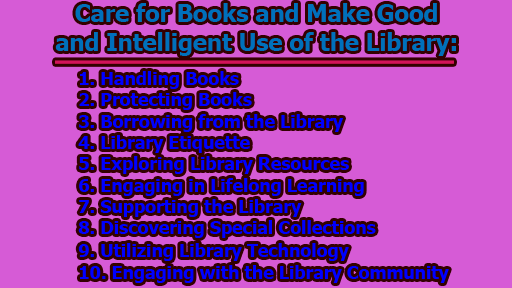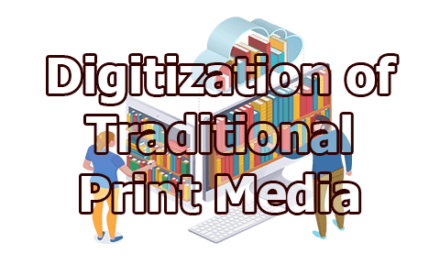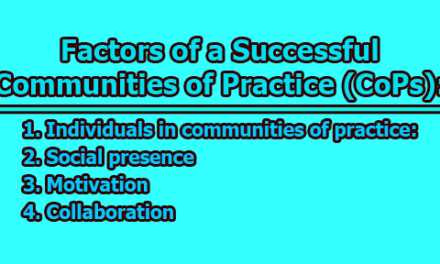Care for Books and Make Good and Intelligent Use of the Library:
Caring for books and making good and intelligent use of the library are important skills that can enhance your reading experience and maximize the resources available to you. Here are some tips on how to care for books and make the most of your library:
- Handling Books:
- Avoid placing heavy objects on top of books, as this can cause damage to the covers, spine, or pages.
- Use clean and dry hands when handling books to prevent smudging or transferring oils onto the pages.
- If you need to write notes or highlight in a book, consider using sticky notes or using a pencil instead of pen, as pencil marks can be erased more easily.
- Protecting Books:
- Keep books away from areas prone to high humidity, such as basements or bathrooms, as excessive moisture can cause mold or mildew growth.
- Use bookends to support upright books and prevent them from leaning or falling over, which can lead to misshapen spines or damage to neighboring books.
- For particularly valuable or rare books, consider storing them in acid-free archival boxes or special collections to provide an added layer of protection.
- Borrowing from the Library:
- Take advantage of any digital library resources, such as e-books or online databases, which can be accessed remotely, expanding your access to reading materials beyond the physical library space.
- If you borrow books frequently, consider keeping a record of the books you have borrowed and their due dates to help you stay organized and avoid late fees.
- Make use of any library apps or online tools that allow you to manage your borrowed items, renew books, or place holds for popular titles.
- Library Etiquette:
- Respect designated quiet areas in the library and keep noise levels to a minimum. Conversations should be conducted quietly and in designated areas.
- Follow any rules regarding food and drinks in the library. If allowed, ensure that containers are properly sealed to prevent spills or accidents.
- Treat library staff and fellow patrons with courtesy and respect, asking for help or assistance when needed in a polite and considerate manner.
- Exploring Library Resources:
- Check if your library offers access to online courses, language learning programs, or educational platforms that can complement your reading interests and provide additional learning opportunities.
- Don’t limit yourself to just books. Explore other resources such as DVDs, CDs, graphic novels, or magazines that may pique your interest or offer alternative formats for information and entertainment.
- Participate in library workshops or seminars on topics such as research skills, digital literacy, or creative writing, which can enhance your knowledge and expand your abilities.
- Engaging in Lifelong Learning:
- Join book clubs or reading groups organized by the library to connect with fellow readers, share insights, and engage in stimulating discussions about books.
- Utilize the library’s resources for research or academic purposes. Librarians can help you navigate databases, find scholarly articles, or access reference materials to support your studies or personal research projects.
- Consider volunteering at your local library to contribute to its operations, promote literacy, and gain a deeper understanding of how libraries function.
- Supporting the Library:
- Consider donating books to your local library if they accept donations. Ensure the books are in good condition and align with the library’s collection policies.
- Participate in library fundraisers or events to support the library’s initiatives and contribute to the expansion of its resources and services.
- Provide feedback to the library staff about your experience, suggestions for improvement, or requests for specific books or resources. Your input can help shape the library’s offerings and enhance the experience for other patrons as well.
- Discovering Special Collections:
- Inquire about any special collections or archives housed within the library. These collections may contain rare books, manuscripts, historical documents, or artifacts that provide unique insights into various subjects.
- Familiarize yourself with the guidelines for accessing and using special collections materials, as they often require special handling or appointments with library staff.
- Take advantage of any exhibitions or displays featuring items from the special collections, as they can offer a glimpse into rare and valuable works that are not typically available for borrowing.
- Utilizing Library Technology:
- Stay up to date with the technological resources offered by your library, such as 3D printers, digital scanners, or virtual reality tools. These resources can open up new possibilities for exploration, creativity, and learning.
- Attend technology workshops or training sessions offered by the library to enhance your digital skills and take full advantage of the available technology.
- Explore the library’s website or online portals for additional resources, such as online tutorials, research guides, or access to online courses and certifications.
- Engaging with the Library Community:
- Attend author readings, literary festivals, or book launches organized by the library to connect with authors, engage in literary discussions, and expand your network within the reading community.
- Participate in community programs, such as storytelling sessions, writing workshops, or book drives, to contribute to the cultural and educational initiatives supported by the library.
- Join or initiate a book exchange program within the library community, where members can swap books, recommend reads, and share their love for literature.
- Exploring Digital Resources:
- Take advantage of the library’s online databases, digital magazines, and newspapers, which often provide access to a wide range of articles, research papers, and current news.
- Explore the library’s digital archives, if available, which can offer a wealth of historical documents, photographs, and primary sources that can enhance your research or personal interests.
- Consider utilizing the library’s online platforms for e-learning, such as language learning courses, coding tutorials, or specialized educational resources that can help you develop new skills and knowledge.
- Engaging with Library Staff:
- Build a rapport with the library staff and librarians. They can offer valuable recommendations, provide assistance with research projects, or help you navigate the library’s resources effectively.
- Attend library workshops or one-on-one sessions with librarians to improve your research skills, learn about citation styles, or explore specialized databases relevant to your interests.
- Ask for assistance in locating specific books or resources, as librarians have a wealth of knowledge and expertise in finding information.
- Participating in Reading Challenges:
- Join reading challenges or programs organized by the library, such as summer reading challenges or themed reading lists. These initiatives can motivate you to explore new genres, authors, or subjects.
- Track your progress and share your reading achievements with the library community. Many libraries provide platforms or forums where readers can connect and discuss their reading experiences.
- Respecting Intellectual Property:
- Adhere to copyright laws when using library resources. Respect the intellectual property rights of authors, publishers, and content creators.
- If you come across instances of plagiarism or copyright infringement in library materials, report it to the library staff so they can address the issue appropriately.
- Supporting Local Authors:
- Explore the library’s local author section or inquire about events featuring local authors. Support the work of writers in your community by reading their books, attending their readings, and spreading the word about their work.
- Suggest local authors or books for the library to acquire, as it can contribute to the representation of diverse voices and perspectives in the library’s collection.
- Sharing Feedback and Reviews:
- Provide feedback or reviews for books you have borrowed from the library. This can help other readers make informed decisions and offer valuable insights to the library staff for future acquisitions and recommendations.
- Consider sharing your thoughts and recommendations on online platforms, such as the library’s website, social media channels, or book-related websites, to contribute to a wider literary community and connect with fellow readers.
In conclusion, caring for books and making good and intelligent use of the library are essential practices that can enhance your reading experience, expand your knowledge, and contribute to the overall well-being of the library community. By handling books with care, protecting them from damage, and utilizing the resources and services offered by the library, you can make the most of your reading journey and foster a lifelong love for literature and learning.
Caring for books involves handling them properly, protecting them from environmental factors, and respecting their physical condition. By treating books with respect and following best practices for their care, you ensure their longevity and maintain their value for future readers.
Making good and intelligent use of the library involves utilizing its resources effectively, engaging with the library community, and taking advantage of the various services available. By exploring the library’s collections, attending events, and actively participating in reading programs and discussions, you can expand your literary horizons, connect with like-minded individuals, and contribute to the vibrancy of the library community.
Additionally, supporting the library through donations, feedback, and involvement in its initiatives helps sustain its services and promote a culture of reading and learning. By actively participating in the library’s offerings, you contribute to the enrichment of the community, support local authors, and create a positive and inclusive reading environment for all.
By embracing the practices of caring for books and making intelligent use of the library, you not only foster a deep appreciation for literature but also engage in lifelong learning, personal growth, and community involvement. So, let us cherish books, respect libraries, and embark on an enriching journey of knowledge and discovery through the wonderful world of reading.
FAQs:
How can I protect books from damage?
To protect books, store them in a clean and dry environment away from direct sunlight and high humidity. Use book covers or sleeves for added protection, and handle books with clean hands to avoid smudging or transferring oils onto the pages.
How can I make the most of my library membership?
You can make the most of your library membership by exploring its resources, attending library events, and utilizing online platforms. Borrow books, e-books, or audiobooks, access online databases and digital magazines, and participate in workshops or reading programs organized by the library.
How can I contribute to the library community?
There are several ways to contribute to the library community. You can volunteer at the library, participate in library fundraisers, donate books, provide feedback or reviews, and support local authors or initiatives organized by the library.
What should I do if I accidentally damage a book borrowed from the library?
If you accidentally damage a book borrowed from the library, it’s best to inform the library staff immediately. They can guide you on the appropriate steps to take, which may include paying for repairs or replacement costs.
How can I engage with the library staff to maximize my library experience?
Engaging with the library staff can enhance your library experience. Seek their assistance in locating specific books or resources, attend workshops or training sessions they offer, and ask for recommendations or guidance in utilizing library services effectively.
How can I find books on a specific topic at the library?
To find books on a specific topic at the library, you can use the library’s online catalog or ask a librarian for assistance. They can guide you in searching by title, author, subject, or keywords related to your topic of interest.
Can I borrow e-books or audiobooks from the library?
Yes, many libraries offer e-books and audiobooks as part of their digital collections. Check with your library to see if they provide access to digital materials and learn how to borrow them using their designated platforms or apps.
What should I do if a book I want to borrow is already checked out by someone else?
If a book you want to borrow is already checked out, you can place a hold or request for the book at the library. They will notify you when the book becomes available, and you can pick it up at that time.
How can I keep track of the books I have borrowed from the library?
You can keep track of the books you have borrowed from the library by maintaining a personal reading log or using online tools provided by the library. Many libraries have systems that allow you to view your borrowing history and due dates online.
Can I request books that the library doesn’t currently have in its collection?
Yes, many libraries allow patrons to request books or materials that are not currently in their collection. You can inquire with the library staff about their interlibrary loan service or suggest specific titles for acquisition.

Library Lecturer at Nurul Amin Degree College










